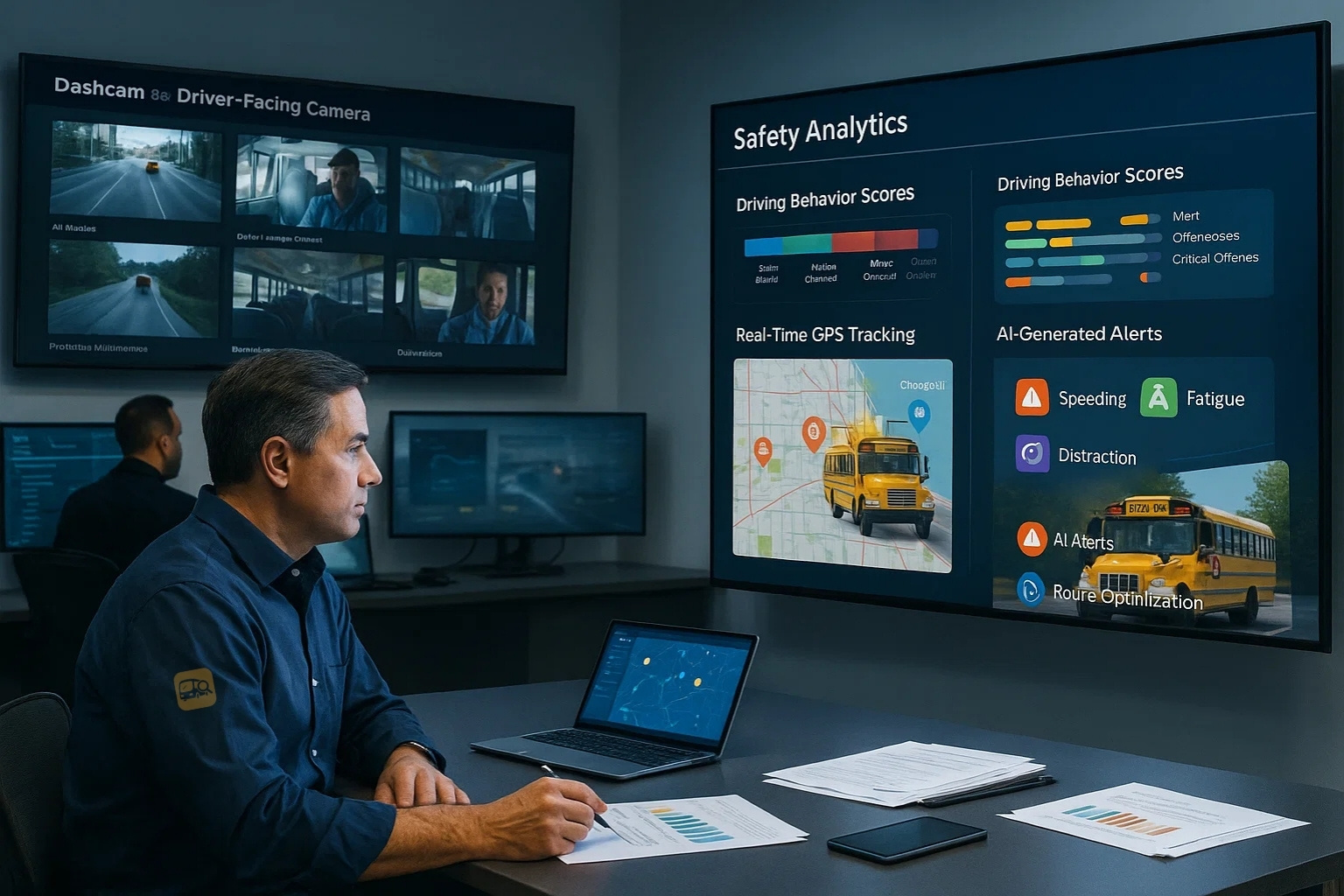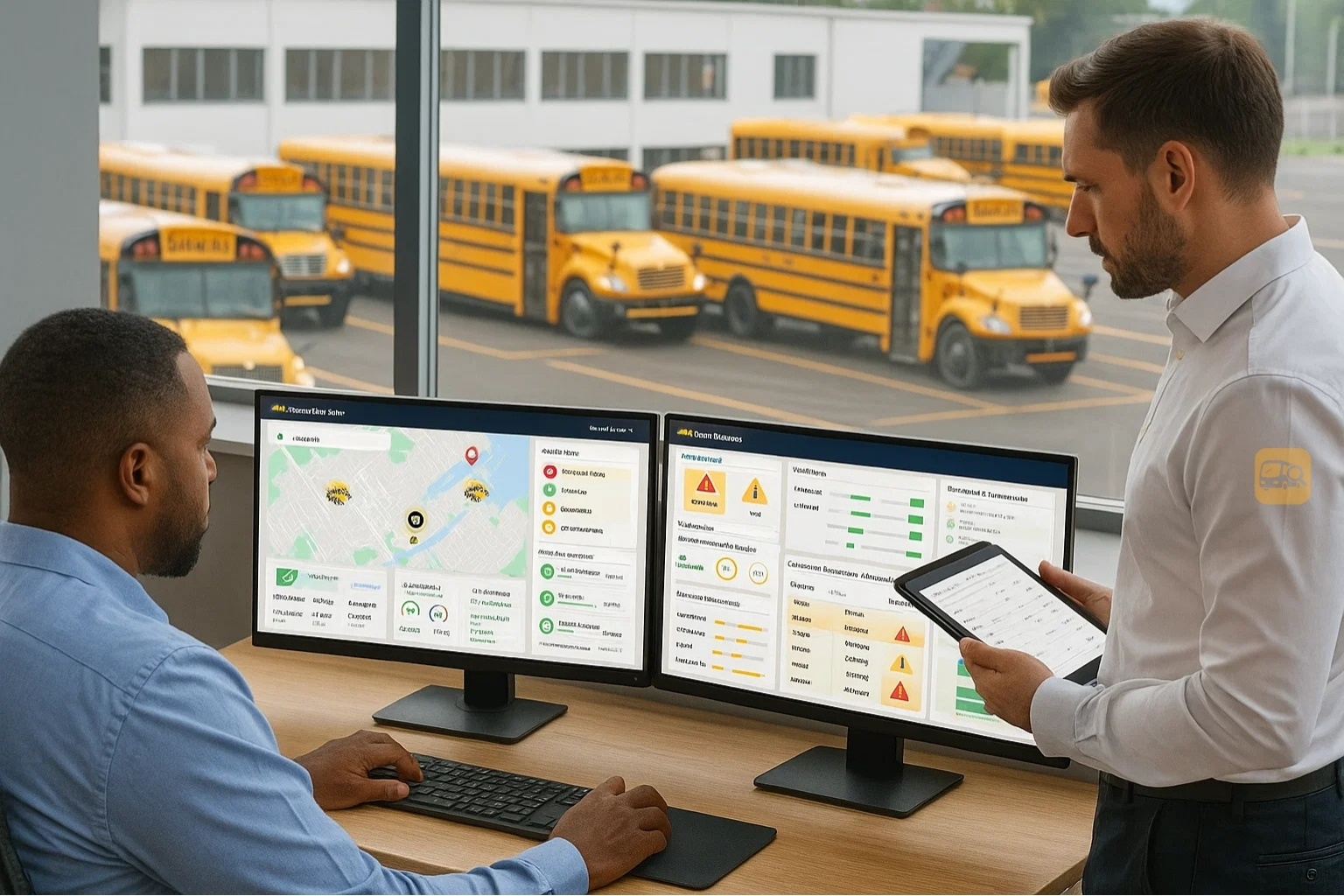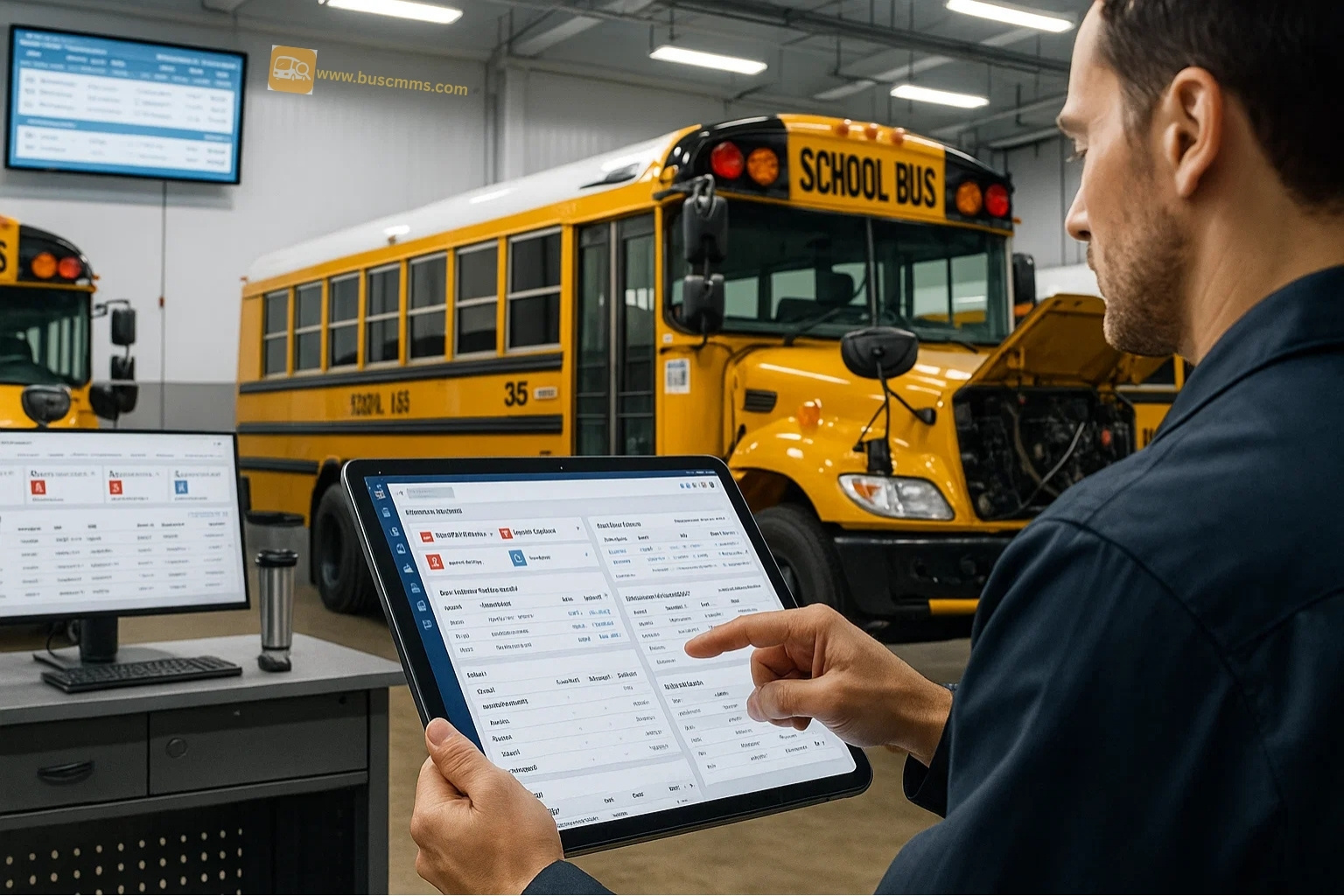GPS tracking technology has fundamentally transformed school bus operations, providing unprecedented visibility into fleet movements while enhancing student safety and operational efficiency. For US manufacturing professionals ready to get started in the transportation sector, understanding the capabilities and benefits of modern GPS systems represents a critical opportunity to support districts seeking comprehensive fleet management solutions.
Today's school bus GPS tracking solutions extend far beyond simple location monitoring. Advanced GPS systems integrate seamlessly with CMMS systems, route optimization algorithms and comprehensive fleet software platforms to create intelligent transportation ecosystems. These integrated solutions provide real-time insights that enable proactive decision-making, predictive maintenance scheduling, and enhanced compliance management across entire school bus fleets.
Real-Time Location Monitoring and Fleet Visibility
Modern GPS tracking provides comprehensive real-time visibility into school bus locations, enabling transportation coordinators to monitor entire fleets from centralized command centers. Advanced GPS systems update vehicle positions every 10-30 seconds, providing precise location data that integrates seamlessly with digital mapping platforms and fleet management dashboards.
This real-time visibility extends beyond simple dot-on-map tracking. Contemporary systems provide detailed insights into vehicle speed, direction, stop duration, and route adherence. For manufacturing professionals looking to book a demo, this represents sophisticated data collection and processing capabilities that must integrate with existing school information systems and provide actionable intelligence for fleet operators.
Technology Integration: Modern GPS tracking systems seamlessly integrate with fleet automation tools, enabling automatic alerts for route deviations, unauthorized vehicle use, and maintenance scheduling based on mileage and engine hours. This integration reduces administrative overhead while improving fleet compliance and operational reliability.
Optimize Your Fleet Operations Today
Experience how advanced GPS tracking can transform your school bus fleet management with real-time monitoring and automated maintenance scheduling.
Getting Started Book a DemoEnhanced Student Safety and Security Features
Student safety represents the paramount concern in school transportation, and GPS tracking technology provides multiple layers of security enhancement. Advanced systems monitor driver behavior, track bus stops, and provide real-time alerts for emergency situations or route deviations that could impact student welfare.
GPS-enabled safety features include geofencing capabilities that automatically alert administrators when buses deviate from approved routes, speed monitoring systems that provide instant notifications for unsafe driving behavior, and panic buttons that enable drivers to instantly communicate emergency situations to dispatch centers. These features create comprehensive safety networks that protect students while providing parents and administrators with peace of mind when they get started with modern fleet solutions.
Integration with student information systems enables automatic verification of student pickup and drop-off locations, ensuring that children board the correct buses and arrive safely at their designated stops. This level of integration requires sophisticated data management capabilities that demonstrate the evolution of GPS tracking from simple location services to comprehensive safety management platforms.
Emergency response capabilities have been revolutionized through GPS integration. When incidents occur, dispatchers can instantly locate the nearest buses, coordinate alternative transportation, and provide precise location information to emergency responders. This rapid response capability has proven critical in medical emergencies and severe weather situations. Book a demo to see these safety features in action.
Route Optimization and Operational Efficiency
GPS tracking data provides the foundation for sophisticated route optimization that dramatically improves operational efficiency. Advanced algorithms analyze historical GPS data to identify the most efficient routes, optimal stop locations, and ideal timing for pickup and drop-off sequences. This data-driven approach to route planning reduces fuel consumption, minimizes travel time, and improves on-time performance.
Real-time traffic integration enables dynamic route adjustments based on current road conditions, construction delays, and weather impacts. GPS systems automatically reroute buses around traffic congestion while maintaining communication with parents and schools about arrival time adjustments. This adaptive routing capability represents a significant advancement over static route planning approaches that many districts are eager to get started implementing.
For manufacturing professionals, understanding these route optimization capabilities is essential for developing integrated fleet software solutions. Modern GPS tracking must accommodate complex algorithmic processing while maintaining real-time responsiveness and seamless integration with existing transportation management systems.
Revolutionize Your Route Planning
Discover how intelligent route optimization can reduce fuel costs by 25% while improving on-time performance and student safety.
Getting Started Book a DemoFleet Management Integration and CMMS Connectivity
Contemporary GPS tracking solutions integrate seamlessly with comprehensive fleet management platforms and CMMS systems to provide holistic operational oversight. GPS data feeds directly into maintenance scheduling algorithms, automatically triggering service reminders based on mileage, engine hours, and usage patterns collected through continuous monitoring.
This integration enables predictive maintenance strategies that significantly reduce emergency repairs and extend vehicle life. GPS systems monitor engine performance metrics, track fuel consumption patterns, and identify vehicles requiring attention before mechanical issues impact operations. The resulting data helps fleet managers optimize maintenance schedules while ensuring regulatory compliance. Book a demo to explore these integration capabilities.
Driver safety monitoring represents another critical integration point. GPS tracking systems analyze acceleration patterns, braking behavior, and speed compliance to identify drivers requiring additional training or coaching. This data-driven approach to driver management improves safety outcomes while reducing insurance costs and liability exposure for districts ready to get started with comprehensive fleet solutions.
Fleet compliance management has been streamlined through GPS integration with regulatory reporting systems. Automated logs track driver hours, vehicle inspections, and route compliance, generating reports that meet federal and state requirements while reducing administrative burden on transportation staff.
Cost Reduction and Return on Investment
The financial benefits of GPS tracking implementation extend across multiple operational areas, creating compelling return on investment scenarios for school districts. Fuel cost reductions through optimized routing typically generate savings of 15-20% annually, while improved maintenance scheduling reduces emergency repair costs by up to 30%.
Administrative efficiency improvements provide additional cost benefits through reduced staff time spent on route planning, parent communications, and manual fleet monitoring. GPS tracking automation eliminates many time-consuming manual processes while improving accuracy and responsiveness of transportation operations. Organizations can get started today to realize these savings immediately.
Insurance premium reductions represent another significant cost benefit. Many insurance providers offer substantial discounts for fleets equipped with comprehensive GPS tracking and driver monitoring systems. These discounts, combined with reduced accident rates from improved driver behavior monitoring, create ongoing financial benefits that compound over time. Book a demo to calculate your potential ROI.
School bus GPS tracking solutions have evolved into sophisticated fleet management platforms that enhance safety, improve operational efficiency, and provide compelling cost savings. For US manufacturing professionals, these systems represent the future of integrated transportation technology.
Success in this market requires understanding that modern GPS tracking extends far beyond location monitoring to encompass comprehensive fleet automation, predictive maintenance integration, and data-driven decision making capabilities that transform how school districts approach transportation management. Get started today to join the revolution in school bus fleet management.
Ready to Transform Your Fleet?
Take the first step toward modernizing your school bus fleet with cutting-edge GPS tracking and comprehensive CMMS solutions that deliver measurable ROI.
Getting Started Book a DemoFrequently Asked Questions
Q: How accurate are modern school bus GPS tracking systems?
A: Modern GPS systems provide accuracy within 3-5 meters under normal conditions, with 99.7% reliability for location tracking. Advanced systems use multiple satellite networks and cellular backup to ensure continuous monitoring even in challenging environments like urban canyons or heavily forested areas.
Q: What safety features do GPS tracking systems provide for school buses?
A: GPS tracking systems offer comprehensive safety features including real-time location monitoring, geofencing alerts for route deviations, speed monitoring with instant notifications, panic buttons for emergency communication, driver behavior analysis, and integration with student information systems for pickup/drop-off verification.
Q: How do GPS systems integrate with fleet management and CMMS platforms?
A: GPS tracking integrates seamlessly with CMMS systems by providing real-time mileage data, engine hours, and usage patterns that trigger automatic maintenance scheduling. The systems also feed data into fleet automation tools for route optimization, fuel management, and compliance reporting, creating comprehensive operational oversight.
Q: What cost savings can districts expect from implementing GPS tracking?
A: Districts typically see 15-20% fuel cost reductions through route optimization, 30% fewer emergency repairs through predictive maintenance, 45% reduction in administrative time for fleet management, and potential insurance premium discounts of 10-15%. Most implementations achieve full ROI within 12-18 months.
Q: Can parents access real-time bus location information?
A: Yes, many GPS tracking systems include parent portals or mobile apps that provide real-time bus locations, estimated arrival times, and delay notifications. These systems typically include privacy controls and only show information relevant to their child's assigned bus route, improving communication while maintaining security.








